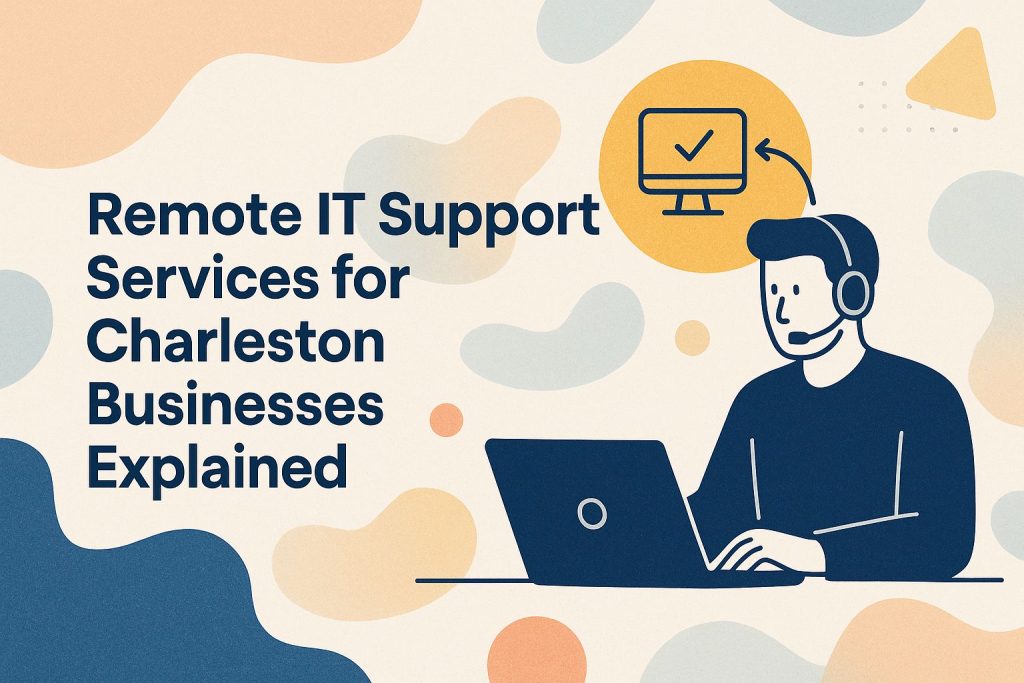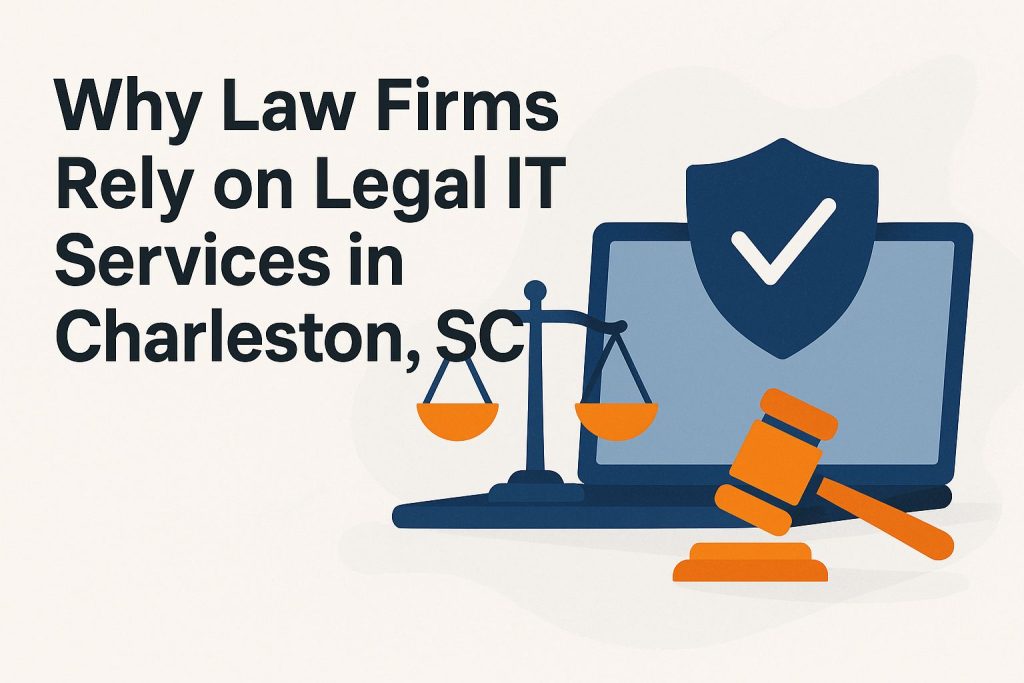Remote IT Support for the Legal Industry
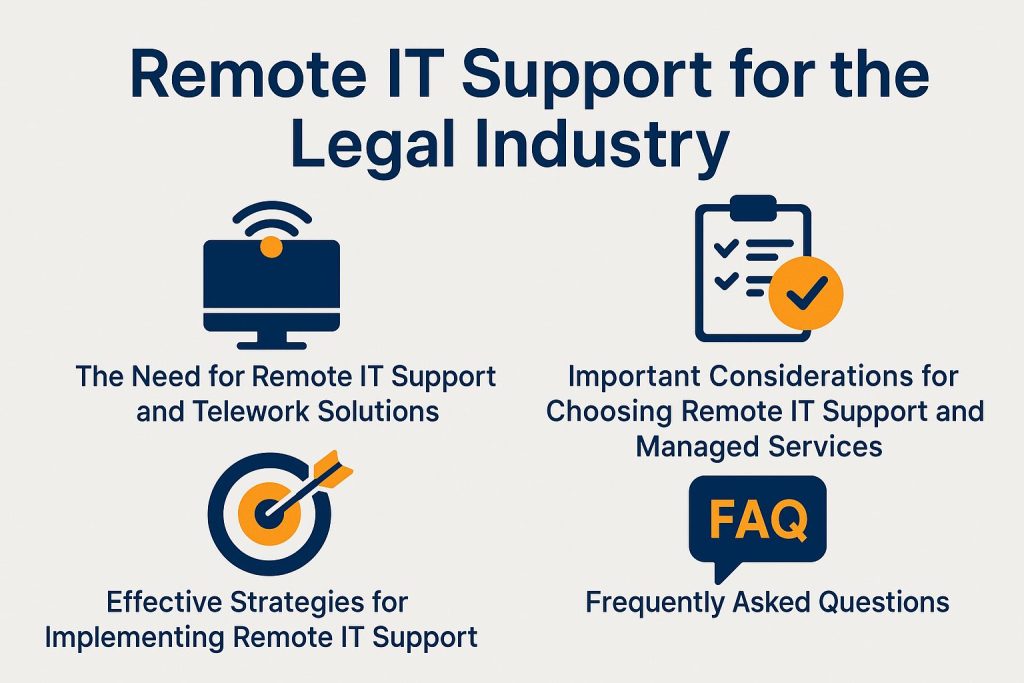
Technology is evolving. Law firms need IT support that is efficient, secure, and compliant. This article explores remote IT support for the legal industry. It highlights the challenges law firms face and the benefits of remote services. From security considerations to best practices for implementation, it elucidates how effective remote IT solutions can enhance a firm’s operations and improve client service.
The Need for Remote IT Support and Telework Solutions in the Legal Industry
The legal industry faces distinct challenges. These challenges require robust remote IT support solutions and telecommuting options. This helps maintain operational efficiency, ensures data protection, and complies with evolving regulations.
Law firms are increasingly dependent on technology for managing legal data, overseeing document management, and facilitating e-discovery processes, all of which require high levels of cybersecurity, user authentication, and encryption to safeguard sensitive client information.
Additionally, as the legal landscape transitions towards digital transformation, the adoption of cloud solutions, such as cloud storage and cloud computing, has become essential for maintaining a competitive advantage.
Given the rising incidence of cyber threats, it is imperative for law firms to prioritize IT services that not only protect their information but also enhance their overall IT infrastructure, ensuring adherence to legal ethics in technology.
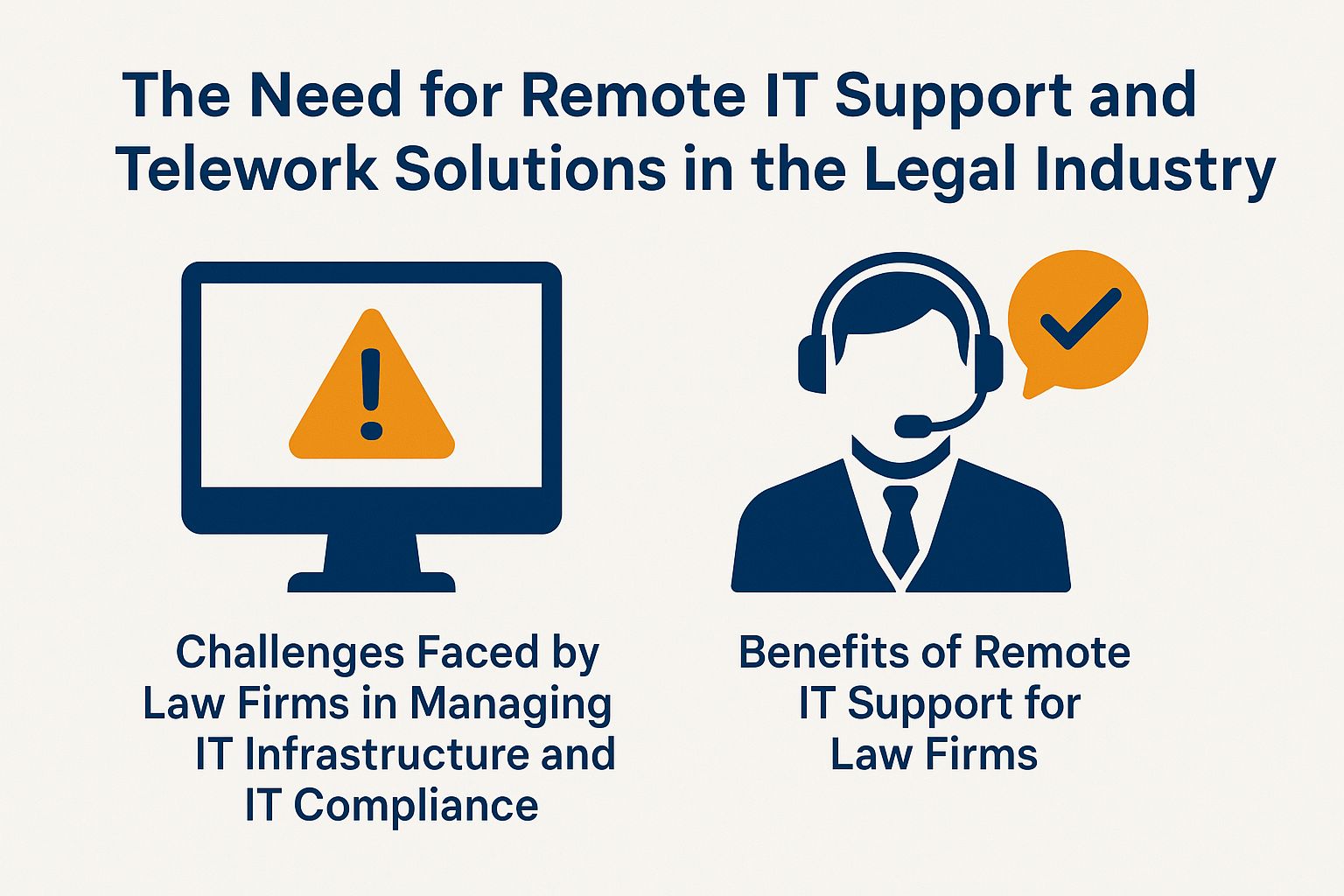
Challenges Faced by Law Firms in Managing IT Infrastructure and IT Compliance
Law firms face many challenges in IT management. Cybersecurity and compliance with regulations are key focuses.
These challenges worsen due to rising data breaches. These breaches threaten sensitive client information, disrupt operations, affect compliance, and harm reputations.
Effective incident response strategies and IT audits are crucial. They help address vulnerabilities quickly and keep clients informed.
The complexities of legal data management necessitate a comprehensive understanding of IT policies governing data use and storage, requiring robust cybersecurity measures to defend against evolving threats.
In this context, risk management emerges as an essential process, as firms need to remain vigilant and proactive in their efforts to protect both their assets and the trust of their clients.
Benefits of Remote IT Support for Law Firms
Remote IT support offers many benefits for law firms. It improves efficiency and strengthens cybersecurity. This innovative approach not only elevates technical support but also equips legal professionals with advanced virtual assistance capabilities, facilitating seamless communication and collaboration regardless of their location.
By utilizing remote monitoring solutions, law firms can proactively detect issues before they escalate, thereby ensuring minimal disruption to critical processes. Additionally, streamlined disaster recovery processes enable rapid data restoration and the protection of sensitive information.
Ultimately, focusing on IT performance metrics and user support boosts productivity. It creates a responsive IT environment for the legal field, which is essential for accommodating the dynamic demands of the legal landscape. To delve deeper into how managed IT services can provide substantial returns, learn more about the ROI of managed IT services for Charleston businesses.
Important Considerations for Choosing Remote IT Support and Managed Services
Choosing the right remote IT support provider is essential for law firms. It significantly influences their ability to uphold security, compliance, and operational integrity in their IT infrastructure and network.
Factors like the provider’s experience in the legal industry and their skills in IT governance and risk management are critical. They help law firms protect client data and comply with regulations.
Furthermore, the provider must understand cybersecurity measures, compliance tools, and risk management strategies. This is vital for protecting the firm’s reputation and maintaining client trust.
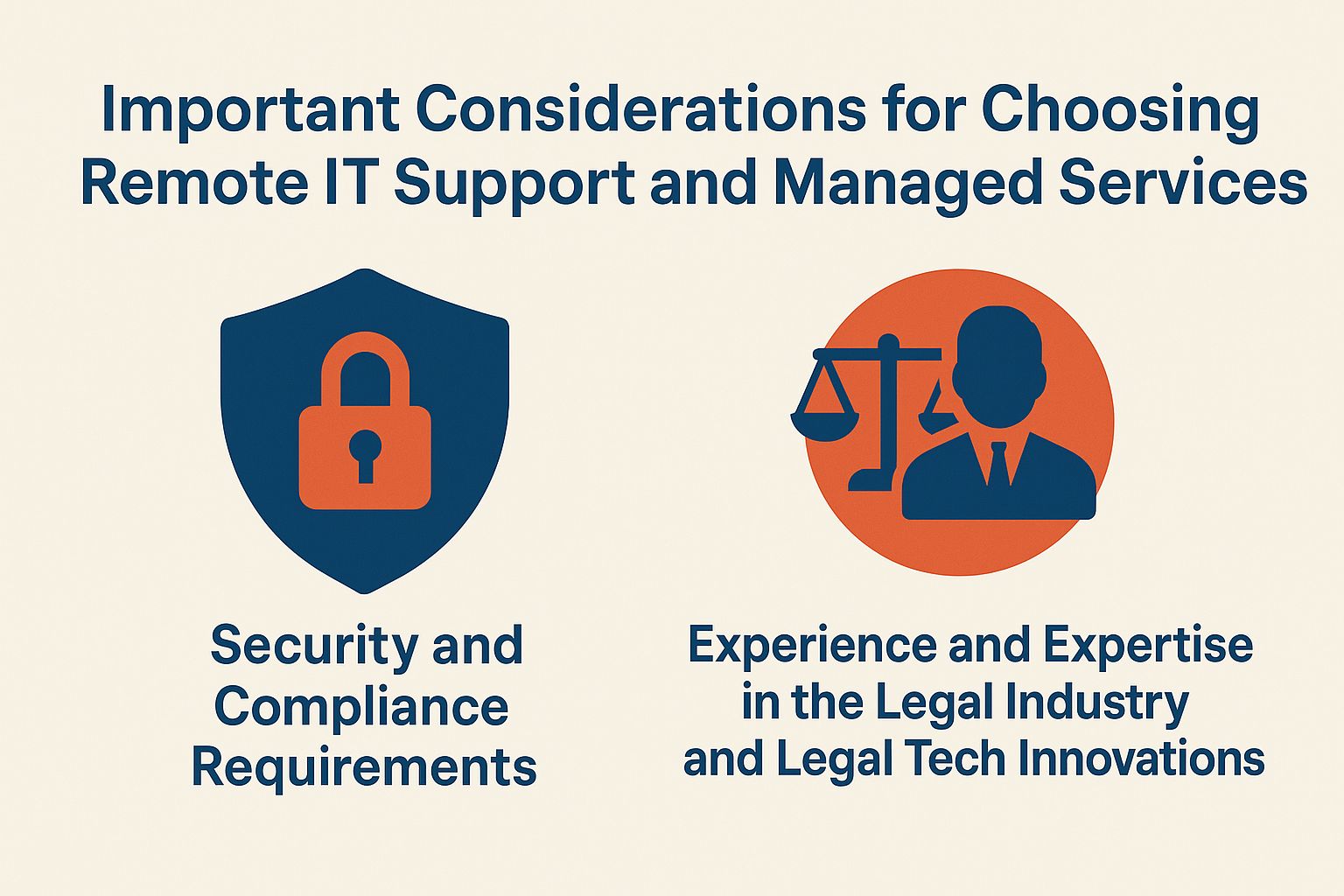
Security and Compliance Requirements
Security and compliance are critical for law firms. They must understand the latest cybersecurity threats and legal regulations. This understanding not only facilitates the development of robust IT policies but also plays a vital role in effective risk management strategies.
Law firms must prioritize the implementation of stringent cybersecurity protocols that protect client data from potential breaches and unauthorized access. Additionally, fostering a culture of ongoing security awareness training for employees is essential, ensuring that everyone remains vigilant against evolving threats.
By adhering to compliance requirements, law firms can safeguard sensitive information and preserve their reputation in a digital landscape.
Experience and Expertise in the Legal Industry and Legal Tech Innovations
The experience and expertise of a remote IT support provider in the legal industry are crucial. They customize IT services to meet specific operational needs.
In an increasingly complex legal landscape, the capability of IT support professionals to navigate legal technology is essential. Their understanding of software integration plays a significant role in streamlining workflows and ensuring that various legal applications function cohesively.
These experts are well-prepared to tackle the unique challenges faced by law firms, including compliance issues and data security, thereby enhancing overall operational efficiency. By optimizing law firm operations and improving legal data management, they enable legal professionals to concentrate on delivering high-quality services to their clients, ultimately leading to better outcomes and increased client satisfaction.
Effective Strategies for Implementing Remote IT Support
Implementing remote IT support effectively requires a strategic approach. This emphasizes best practices, uses appropriate communication tools, and deploys efficient remote access solutions. Additionally, ensuring robust cybersecurity measures is crucial, as outlined in our guide on IT Security Charleston.
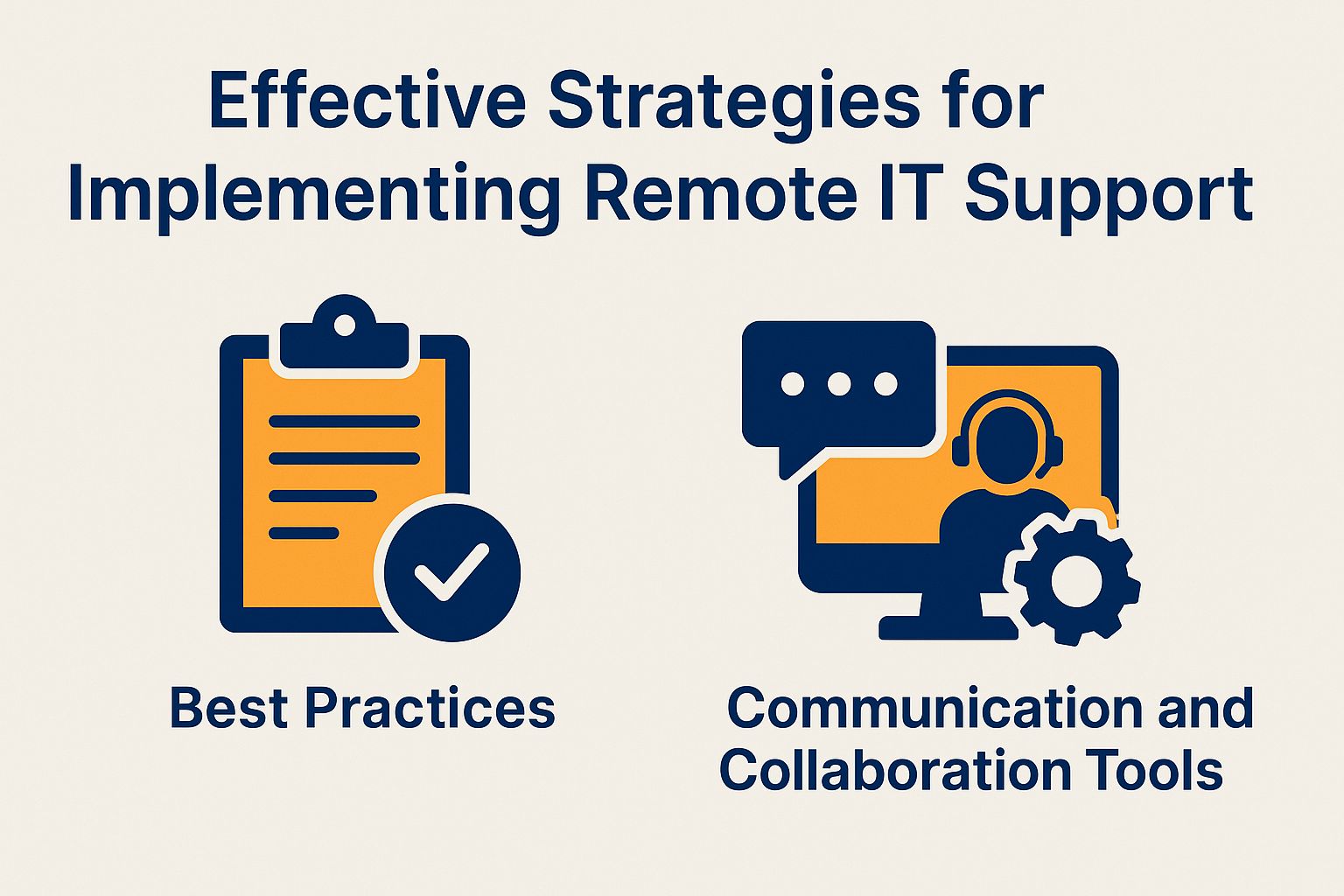
Best Practices for Remote IT Support Implementation
Following best practices is essential for successfully implementing remote IT support in law firms. This involves establishing a clear IT strategy and committing to regular performance monitoring to ensure that all systems are operating optimally.
User training programs are crucial. They empower staff to navigate compliance tools easily and understand their importance for IT governance and system security.
With appropriate ongoing IT support contracts, such as service level agreements (SLA), in place, law firms can experience the benefits of streamlined processes, hardware upgrades, and increased productivity, ultimately contributing to a more secure and efficient legal practice.
Communication and Collaboration Tools for Remote Support and Remote Software Support
Effective communication and collaboration tools are essential for the success of Remote IT Support, as they facilitate seamless interaction among team members and support remote troubleshooting.
These tools enable real-time problem-solving and foster a sense of camaraderie, even when team members are physically distant. By integrating robust video conferencing, instant messaging, and project management platforms into their IT infrastructure, law firms can significantly enhance digital communication and streamline workflows.
The result is an agile environment where quick decisions can be made, issues are resolved promptly, and remote teams can collaborate effectively.
Consequently, leveraging these technologies improves operational efficiency. It also ensures firms maintain high client service and engagement, even with geographical challenges.
Frequently Asked Questions
What is remote IT support for the legal industry?
Remote IT support helps legal firms with technical problems. It connects remotely, not in-person.
Benefits of Remote IT Support for the Legal Industry
Remote IT support solves technical issues quickly. This lets legal professionals focus on their work without interruptions.
What services are typically included in remote IT support for the legal industry?
Common services include troubleshooting software and hardware, setting up networks, backing up data, improving cybersecurity, and offering remote access solutions.
Is remote IT support secure for the legal industry?
Yes, most remote IT support providers use strong security and encryption. This keeps legal data confidential and safe.
How to Access Remote IT Support
Legal professionals can access remote IT support by phone, email, chat, or remote access tools.
Can Remote IT Support Be Customized for Legal Firms?
Yes, many remote IT support providers customize solutions for each legal firm or professional.
